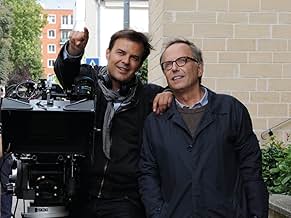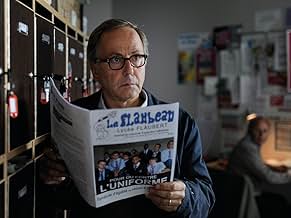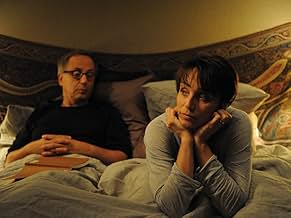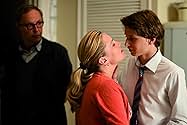VALUTAZIONE IMDb
7,3/10
35.478
LA TUA VALUTAZIONE
Un insegnante di liceo francese viene coinvolto nella storia sempre più trasgressiva di uno studente precoce sulla sua relazione con la famiglia di un amico.Un insegnante di liceo francese viene coinvolto nella storia sempre più trasgressiva di uno studente precoce sulla sua relazione con la famiglia di un amico.Un insegnante di liceo francese viene coinvolto nella storia sempre più trasgressiva di uno studente precoce sulla sua relazione con la famiglia di un amico.
- Regia
- Sceneggiatura
- Star
- Premi
- 10 vittorie e 23 candidature totali
Jana Bittnerová
- La doublure de la jumelle
- (as Jana Bittnerova)
Recensioni in evidenza
Based on Juan Mayorga's play "The Boy in the Back Row", the film is reminiscent of Woody Allen's style with its layered plot.
It's the story of two people and their up and downs in their teacher and student identities, both trying escape to their ideal, in pursuit of reaching their ultima thule. The fiction they need in this escape sometimes turns into reality, but after a point it gets out of control and becomes dangerous. There is a utopia that can never be reached, the existing ones are replaced as it is realized piece by piece, end it gets worse than the beginning. And the movie emphasises this fragility to the audiance. And the ending is not really satisfying, even very weak. Ozon's response: "I think the ending of the movie is clear. I did it on purpose; I wanted the audience to be able to imagine their own movie while watching it. They can imagine a darker ending if they want to." His references to art and literature are very good. I think the biggest hit of the movie is Ernst Umhauer, the lead actor.
Lastly, speaking of Woody Allen; 'Match Point' is the movie that the characters went to see in the cinema, another nice reference.
It's the story of two people and their up and downs in their teacher and student identities, both trying escape to their ideal, in pursuit of reaching their ultima thule. The fiction they need in this escape sometimes turns into reality, but after a point it gets out of control and becomes dangerous. There is a utopia that can never be reached, the existing ones are replaced as it is realized piece by piece, end it gets worse than the beginning. And the movie emphasises this fragility to the audiance. And the ending is not really satisfying, even very weak. Ozon's response: "I think the ending of the movie is clear. I did it on purpose; I wanted the audience to be able to imagine their own movie while watching it. They can imagine a darker ending if they want to." His references to art and literature are very good. I think the biggest hit of the movie is Ernst Umhauer, the lead actor.
Lastly, speaking of Woody Allen; 'Match Point' is the movie that the characters went to see in the cinema, another nice reference.
For his thirteenth feature film, French New Wave director Francois Ozon has outdone all acclaim given to his 2002 remake of "8 Women" with a mischievous and dysfunctional tale, of what can be perceived as
coming-of-age.
A black comedy conflated with so much grandeur from literary greats to post-modern poioumena, you cannot help but wave the white flag and just go along in service of jest and sheer curiosity.
Adapted from a brilliant play written by Juan Mayorgo, this film is a meta-narrative centered on Claude Garcia (Ernst Umhauer) -- a sixteen year old loner who intrudes upon the home life of fellow student Rapha Jr., and writes about it. What begins as a one-off weekend assignment for literature class, escalates with great passion and frequency when Claude's teacher, Germaine (Fabrice Luchini) detects flashes of talent and decides to groom the teenager.
Here, Ozon proposes a three-fold narrative weaving through the surface of three realities -- Germaine's growing obsession with Claude's story imitates the viewers' relationship with Ozon's film (and perhaps soap opera addiction), and Claude as a self-conscious narrator of the events occurring inside Rapha's house.
When the film begins, Claude is unhappy with a lonely life and clearly needs to distract himself with wholesome family warmth. Having witnessed Rapha's close relationship with parents Rapha Sr. and Esther at the school gate, strikes a friendship with the boy when semester begins. Establishing himself as a math tutor and study mate, Claude quickly wins their affection and trust. Thrilled by this opportunity to experience life with a sense of belonging, yet predisposed to primitive urge, Claude's desire swells into furtive yearning for Esther. And naturally, things get complicated.
As Germaine's involvement with Claude's writing departs from passive reader, to that of a story-telling coach superimposing rules of dramatic structure, it occurs to the viewer that he may very well be a shaping hand in the outcome of this voyeuristic experiment.
Of course, the fabrics of fiction and reality overlap but they do not confuse -- the satirical logic unfolds in ways that are thought- provoking, humorous and downright captivating.
cinemainterruptus.wordpress.com
A black comedy conflated with so much grandeur from literary greats to post-modern poioumena, you cannot help but wave the white flag and just go along in service of jest and sheer curiosity.
Adapted from a brilliant play written by Juan Mayorgo, this film is a meta-narrative centered on Claude Garcia (Ernst Umhauer) -- a sixteen year old loner who intrudes upon the home life of fellow student Rapha Jr., and writes about it. What begins as a one-off weekend assignment for literature class, escalates with great passion and frequency when Claude's teacher, Germaine (Fabrice Luchini) detects flashes of talent and decides to groom the teenager.
Here, Ozon proposes a three-fold narrative weaving through the surface of three realities -- Germaine's growing obsession with Claude's story imitates the viewers' relationship with Ozon's film (and perhaps soap opera addiction), and Claude as a self-conscious narrator of the events occurring inside Rapha's house.
When the film begins, Claude is unhappy with a lonely life and clearly needs to distract himself with wholesome family warmth. Having witnessed Rapha's close relationship with parents Rapha Sr. and Esther at the school gate, strikes a friendship with the boy when semester begins. Establishing himself as a math tutor and study mate, Claude quickly wins their affection and trust. Thrilled by this opportunity to experience life with a sense of belonging, yet predisposed to primitive urge, Claude's desire swells into furtive yearning for Esther. And naturally, things get complicated.
As Germaine's involvement with Claude's writing departs from passive reader, to that of a story-telling coach superimposing rules of dramatic structure, it occurs to the viewer that he may very well be a shaping hand in the outcome of this voyeuristic experiment.
Of course, the fabrics of fiction and reality overlap but they do not confuse -- the satirical logic unfolds in ways that are thought- provoking, humorous and downright captivating.
cinemainterruptus.wordpress.com
Often funny, sometimes disturbing and sensual, the movie can be enjoyed at face value, but the heart of the movie lies underneath that appealing veneer, it's about creation and the required necessity to live your life fully to feed it. The budding writer enters the lives of a family, the same way a writer should embrace life itself, with a healthy dose of curiosity and nerve, precisely what his teacher is lacking. Add to that a fascinating and intricate observation of the blurring of lines separating reality from fiction in the feverish midst of artistic creation. Deep stuff, but all wrapped up in a neat bundle, Ozon making sure to leave almost no one on the side of the road, so to speak. So in conclusion it's smart and yet playful, intellectual but never pretentious. Well, in other words, it's a very good movie about potentially boring subjects. Highly recommended in those times of idiocracy!
This is a very interesting film taking both the point of view of a sixteen year old school boy and that of a middle aged teacher, with you dear viewer, playing yet another role. Ah ha, so, what we start with is a perhaps knowingly voyeuristic homework task set by the bored literacy tutor. Then we have the youth delivering precisely the kind of inflammatory story that reignites the tutor's interest. It's a dangerous game they both play - almost as if the boy were repeating the tutor's own youth with his post hoc adult knowledge. The innocents in this tale are ignored - or rather, their real stories are overlooked by both boy writer and his tutor whilst they play their silly game. The tutor's wife sees through the whole charade but then even her story is corrupted by inclusion in the boy's story-making. You, the viewer, need to pick carefully through the evidence you are presented. Do you want the boy to succeed? Do you want to encourage the teacher? Shame on you! You've gone down a garden path you should never have entered! Brilliant!
A wicked little movie that tries to brake boundaries and more than the fourth wall. It raises up a lot of questions and puts up the mirror to a lot of things, while continuously being funny and wicked at the same time. A hilarious attempt at describing what Art means nowadays or how we try to interpret it. Maybe even how we try to create it.
There is more than one story strand in this movie and they all get at least somewhat explored. And while some of those strands may feel like a cliché, the head on approach make them feel like a fresh take on it. You have to have an open mind about the movie and the way it is shot and told, but if you can do that, you might be able to enjoy this very much. Multiple views can also bring up new and exciting things you might not have seen first time around. Whatever the case, I can recommend this to anyone who wants to be intellectually challenged by watching a movie.
There is more than one story strand in this movie and they all get at least somewhat explored. And while some of those strands may feel like a cliché, the head on approach make them feel like a fresh take on it. You have to have an open mind about the movie and the way it is shot and told, but if you can do that, you might be able to enjoy this very much. Multiple views can also bring up new and exciting things you might not have seen first time around. Whatever the case, I can recommend this to anyone who wants to be intellectually challenged by watching a movie.
Lo sapevi?
- QuizErnst Umhauer said this about the character he plays in the movie: "He confuses his writing with reality and turns everything in his path upside-down. He has no distance, it takes him a long time to realize his words are stinging and can do damage. He's smart, but not very conscious of his responsibility".
- Blooper(at around 1h 35 mins) While Claude is walking through park, his hair is parted on different sides between shots.
- Citazioni
Claude Garcia: But I love you.
Esther Artole: No. It's not me you love. It's an image. An image in your head.
- Curiosità sui creditiThe opening credits are shown as if they were hand-written on graph paper.
- ConnessioniReferenced in La noche de...: La noche de... En la casa (2018)
- Colonne sonoreDynasty Tching Memories
Performed by Wang Shu Imperial Orchestra
®2002 FGL Productions S.A, © Editions FGL
Avec l'aimable autorisation de FGL Productions S.A
I più visti
Accedi per valutare e creare un elenco di titoli salvati per ottenere consigli personalizzati
- How long is In the House?Powered by Alexa
Dettagli
- Data di uscita
- Paese di origine
- Siti ufficiali
- Lingua
- Celebre anche come
- En la casa
- Luoghi delle riprese
- Aziende produttrici
- Vedi altri crediti dell’azienda su IMDbPro
Botteghino
- Lordo Stati Uniti e Canada
- 389.757 USD
- Fine settimana di apertura Stati Uniti e Canada
- 31.441 USD
- 21 apr 2013
- Lordo in tutto il mondo
- 16.190.771 USD
- Tempo di esecuzione
- 1h 45min(105 min)
- Colore
- Mix di suoni
- Proporzioni
- 1.85 : 1
Contribuisci a questa pagina
Suggerisci una modifica o aggiungi i contenuti mancanti

















